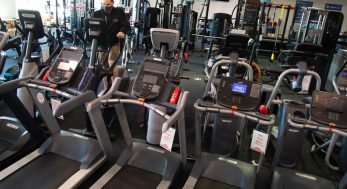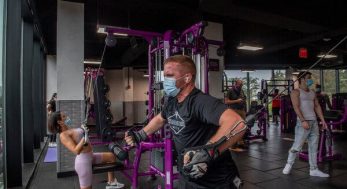
FlamingoImagesGetty Images
- Older, untrained individuals are able to build muscle just as effectively as those who have no experience with exercise, a new study published in Frontiers in Physiology found.
- Having a long-term endurance fitness base does not make muscle-building any easier.
- People of any age can benefit from starting a strength-training plan.
Even if you don’t have a lifetime of fitness behind you, you can still reap the benefits of lifting: Older, untrained people build muscle just as effectively as long-term endurance athletes do, a new study published in Frontiers in Physiology found.
In the study, researchers at the University of Birmingham’s School of Sport, Exercise and Rehabilitation Science in the U.K. compared muscle-building ability in two groups of men in their 70s and 80s. Seven had at least 20 years of regular endurance training under their belts, while eight were unaccustomed to any kind of exercise program. They were all within the same general range of body mass index (BMI), body fat, height, blood pressure, and muscle mass.
Each participant was given an isotope tracer—a type of drink that shows how proteins are developing within the muscle—and then performed a single bout of weight training on a knee-extension machine.
After a warmup set of 10 reps at 40 percent of their one rep max (1RM), the weight was increased to 75 percent of their 1RM, and each participant performed 6 sets of 10 reps, with two minutes of rest between each set.
The researchers believed that the masters athletes would be better able to build muscle because of their years of better fitness. But the results of this study showed that those who haven’t ever done structured exercise programs built muscle just as well as lifetime athletes who are still competitive in their sports.
“It doesn’t seem to matter how active a person may be been throughout their life; it appears their muscles will still respond and rebuild as well as someone who has been highly active all their life,” said lead researcher Leigh Breen, Ph.D., a senior lecturer in exercise physiology and metabolism at the University of Birmingham.
[From training tips, to fueling strategies, to improving the mind-body connection, the Runner’s World 2020 Calendar will help you run your best all year long.]
The study does have its limitations, particularly the small sample size, and the use of only one round of exercise. Also, Breen added that it’s difficult to say whether the response may differ in older women, since the processes that control muscle remodeling have been shown to be different between men and women as they get older—likely as a result in alterations to testosterone and estrogen.
However, even with those caveats, it’s worth promoting strength training to any older people who haven’t tried it before, Breen said.
“Muscle mass and strength is positively associated with better function, lower risk of frailty, better recovery from injury and so on,” he said. “So, focusing training on maintaining or building muscle mass in older age will play a key role in quality of life as one ages.”

